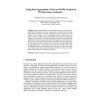130
click to vote
GLOBECOM
2010
IEEE
15 years 2 days ago
2010
IEEE
Duty cycling is often used to reduce the energy consumption caused by idle listening in Wireless Sensor Networks (WSNs). Most studies on WSN protocols define a common duty cycle va...
123
click to vote
ITIIS
2010
15 years 16 days ago
2010
Data routing in wireless sensor networks must be energy-efficient because tiny sensor nodes have limited power. A cluster-based hierarchical routing is known to be more efficient ...
108
click to vote
APSCC
2007
IEEE
15 years 2 months ago
2007
IEEE
Abstract— In this paper, we address the problem of lifetime optimization under storage constraint for wireless sensor networks with a mobile sink node. The problem is particularl...
138
click to vote
DCOSS
2006
Springer
15 years 5 months ago
2006
Springer
When communication in sensor networks occurs over wireless links, confidential information about the communication patterns between sensor nodes could be leaked even when encryptio...
137
click to vote
CDC
2009
IEEE
15 years 6 months ago
2009
IEEE
Abstract— We study the problem of maximizing the aggregated revenue in sensor networks with deadline constraints. Our model is that of a sensor network that is arranged in the fo...
118
click to vote
ICNP
2003
IEEE
15 years 7 months ago
2003
IEEE
Future smart environments will be characterized by multiple nodes that sense, collect, and disseminate information about environmental phenomena through a wireless network. In thi...
103
click to vote
PCI
2005
Springer
15 years 7 months ago
2005
Springer
The main resarch in sensor networks has been focused on minimizing power consumption of sensors to maximize network life time. In some critical applications, however, the most impo...
122
click to vote
INTERSENSE
2006
ACM
15 years 8 months ago
2006
ACM
— Optimizing energy consumption in wireless sensor networks is of paramount importance. There is a recent trend to deal with this problem by introducing mobile elements (sensors ...
112
click to vote
DCOSS
2007
Springer
15 years 8 months ago
2007
Springer
With the field of wireless sensor networks rapidly maturing, the focus shifts from “easy” deployments, like remote monitoring, to more difficult domains where applications imp...
132
click to vote
PERCOM
2007
ACM
15 years 8 months ago
2007
ACM
A substantial amount of research on routing in sensor networks has focused upon methods for constructing the best route, or routes, from data source to sink before sending the dat...

